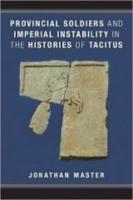
Michigan (2016) h/b 238pp £64.50 (ISBN 9780472119831)
When was a Batavian not a Batavian? Why was the civil war of AD 69 not really a civil war? And perhaps most importantly, what does Augustus have in common with Woody Guthrie?
In this volume Master tackles all of these questions, by coming to grips with slippery issues of identity and categorisation in Tacitus’ Histories. He combines this with a focus on the didactic purpose of history-writing to argue that Tacitus was trying to teach his readers a lesson about ethnicity and the handling of identity by the institutions of empire, concluding that Tacitus’ purpose was to persuade the readers of his own time that ‘a new iteration in the process of the unification of Italy is now required’ (p.194).
The title of this volume has a particular significance which is not immediately apparent. Master derives the term ‘provincial soldiers’ from the modern term ‘ethnic soldiers’, which describes a ‘dialectical process set in motion by … empires’ (p.21) of ethnic categorisation within the military which leads to warlike national or racial identities being assigned to specific military units, offering analogies with the Gurkhas and Highlanders under the British Empire to explain this process. In this analysis the term ‘provincial soldiers’ is not so much a description of origin as it is an analytical tool for unpicking the relationship between the Empire and its forces. Master uses this idea to explore Tacitus’ narrative of the Batavian revolt, the focus of two of the five chapters of this volume.
Master’s analysis runs through all of the twenty-first-century truisms: that ‘Romanization’ is a concept laden with imperialist assumptions; that revisionism is out-dated; and that the split between scholarship on history and historiography needs to be addressed—although he himself rather adds to this last area of concern, by prefacing observations with stark qualifying statements like, ‘In actual Roman history outside of literature…’ (p.196). He wields modern theory, derived from a range of contexts, with enthusiasm, with the caveat that ‘Tacitus would not conceive of Rome’s use of Batavian manpower or the Batavian revolt as do modern military and cultural analysts’ (p. 24). This positions his analysis on slightly shaky methodological ground, but allows him to approach the Histories from an interesting new ‘ethnic’ angle.
For fans of Tacitus, this is a delightful book to read; Master’s analysis is relentlessly positive, seeking things to admire in even the most controversial passages (Tacitus is not anti-Semitic, but is using his narrator persona to prompt the reader’s disagreement with his positioning of Jerusalem as the antithesis of Rome), and searching for previously undetected evidence of Tacitean cleverness.
As Master asserts, ‘The lessons of history remain for us to explore’ (p.19), and this volume is a lively and coherent exploration of the lessons of Tacitus’ Histories. It is not an uncontroversial or a thorough exploration; however, for more advanced students of historiography it offers a contribution to current debates about centre and periphery and globalization, at the same time as asserting Tacitus’ brilliance in assessing and addressing the dangerous instabilities of the Empire in his own time.
Cora Beth Knowles
